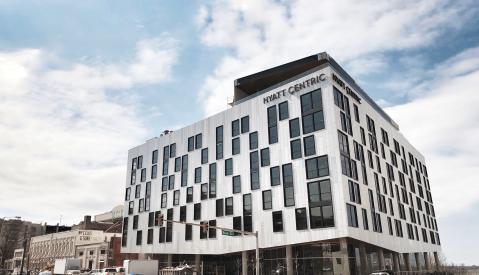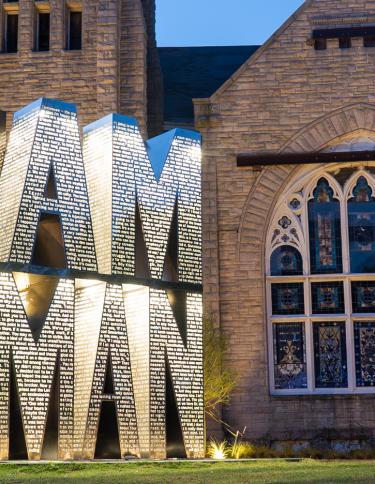
With the recent additions of I AM A MAN Plaza and Stax Museum of American Soul Music, the U.S. Civil Rights Trail, which features over 100 locations across 15 states, now includes eight historic Memphis locations. From Beale Street being a catalyst for African American achievement to the sanitation strike and the assassination of Dr. Martin Luther King Jr. in 1968, the American Civil Rights Movement forever shaped the city of Memphis. Visit these historic landmarks while on your next trip to Memphis and learn about the events that truly changed our city and the nation.
With the recent additions of I AM A MAN Plaza and Stax Museum of American Soul Music, the U.S. Civil Rights Trail, which features over 100 locations across 15 states, now includes eight historic Memphis locations. From Beale Street being a catalyst for African American achievement to the sanitation strike and the assassination of Dr. Martin Luther King Jr. in 1968, the American Civil Rights Movement forever shaped the city of Memphis. Visit these historic landmarks while on your next trip to Memphis and learn about the events that truly changed our city and the nation.
National Civil Rights Museum
The National Civil Rights Museum explores the American Civil Rights Movement from 17th century slavery to present day civil and human rights issues. Located at the Lorraine Motel, where Dr. Martin Luther King Jr. was assassinated, the museum features interactive displays and exhibits where guests will learn about civil rights history and how it has shaped our present and will shape our future. Schedule your visit around upcoming events such as guest speakers, public forums and book talks.
Clayborn Temple
Clayborn Temple served as headquarters and a rallying point for civil rights leaders and activists alike during the Sanitation Workers' Strike in 1968. Daily marches began at the church, where the iconic "I AM A MAN" signs originated from, and would end at City Hall.
Today, Clayborn Temple serves as a special events venue, national meeting space and home to a congregation. Preservation groups are working to preserve the historic building and its legacy.
I AM A MAN Plaza
Visit the I AM A MAN Plaza to learn about the Sanitation Workers' Strike of 1968, how it brought Dr. Martin Luther King, Jr. to Memphis and its major role in civil rights history. The plaza is located on Hernando Street next to Clayborn Temple, a key rallying point for the strike. It features a bold, awe-striking sculpture and wall which includes the names of the brave workers who participated in the strikes.
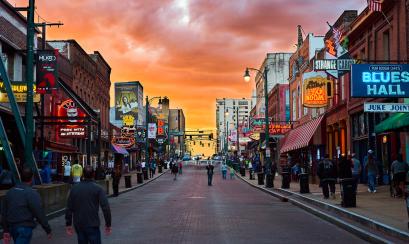
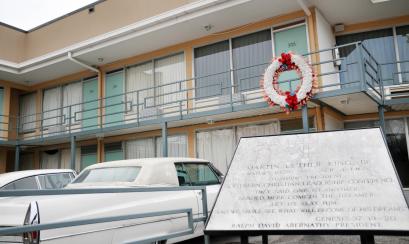
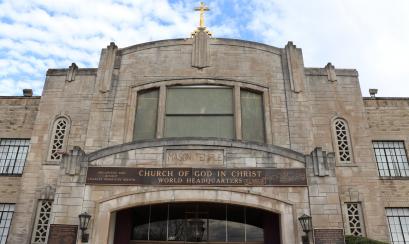
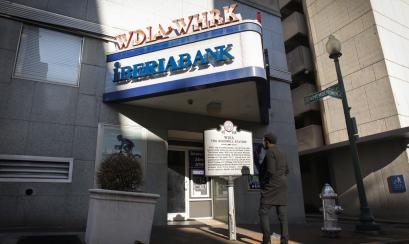
Mason Temple
In support of the Memphis Sanitation Workers' Strike, Dr. Martin Luther King Jr. traveled to Memphis. It was at Mason Temple that he gave his famous "Mountaintop" speech on April 3, 1968, which turned out to be his last address. Dr. King Jr. was assassinated on the balcony outside of his room at the Lorraine Motel the following day.
Today, Mason Temple is the international headquarters for the Church of God in Christ. This historic church is open to the general public (Mon - Fri, 9 a.m. - 4 p.m.), but be sure to give them a call (901-947-9300), as they are occasionally closed for private events. Visitors can also visit Mason Temple on A Tour of Possibilities, which focuses on African American heritage in Memphis.
Discover the history, culture and influence of African Americans in Memphis on A Tour of Possibilities.

Beale Street Historic District
From First Baptist Church housing Ida B. Well's anti-segregationist newspaper to legendary blues musicians getting their start, iconic Beale Street is an epicenter of African American achievement, culture and heritage. Today, people visit Beale Street from all over the world to take in the music, food and nightlife, but also the history. Beale Street is home to multiple museums, tours and attractions that highlight its incredible legacy:
Tour the home of "The Father of The Blues" at the W.C. Handy Home & Musuem. Learn about the legendary musician's life and how he changed Memphis music forever.
The Memphis Rock 'N' Soul Museum, located just off Beale, is the go-to spot when it comes to Memphis music history. But if you want to learn the history of Beale Street, the Memphis Rock 'N' Soul Museum also offers a Beale Street Walking Tour. Go building by building, learning the legacy of the street. From iconic clothiers and popular black-owned businesses to legendary Beale Street performers and Civil Rights rallying points, explore how Beale Street became one of the most famous streets in the world.
Withers Collection Museum and Gallery
Located on Beale Street, the Withers Collection Museum and Gallery features Dr. Ernest C. Withers' archive of photos documenting civil rights events and legendary Beale Street musicians. The Withers Collection Museum and Gallery is the newest location added to the U.S. Civil Rights Trail. Dr. Withers' collection accounts for nearly 2 million photographs and work continues digitalizing them. Some of his most famous work is on view now including the Memphis Sanitation Workers Strike in 1968 and the events leading up to the assassination of Dr. Martin Luther King, Jr. Recently, two images by Withers made the New York Times Style Magazine list of the 25 most significant photographs since 1955.
Stax Museum of American Soul Music
Take a trip to Soulsville U.S.A. and discover the Memphis Sound. Learn how music legends of the 60s and 70s, like Otis Redding, Carla Thomas, Booker T. & The M.G.'s, Isaac Hayes and more, began careers that would shape music around the world. While the country was rife with racial tension, this integrated studio welcomed artists regardless of race and produced songs that called for social change in our country.
Take a tour to listen to countless Stax classics while browsing a collection of more than 2,000 interactive exhibits, artifacts, films, photographs, and memorabilia items. Plus, be on the lookout for upcoming events and free programming at the museum.
WDIA
Founded in 1947, WDIA became the nation's first radio station to cater entirely to African Americans. The station, where music greats like B.B. King and Rufus Thomas started their famed careers, broadcasted across much of the South, reaching 10% of the nation's African American population. WDIA also broadcasted and publicized important Civil Rights news happenings, including visits from Dr. Martin Luther King Jr. and updates following Dr. King Jr.'s death.
WDIA, while still an active radio station, has since moved from its original location. Guests can still find WDIA's original home at 112 Union Ave. by spotting the neon WDIA sign and historical marker.
